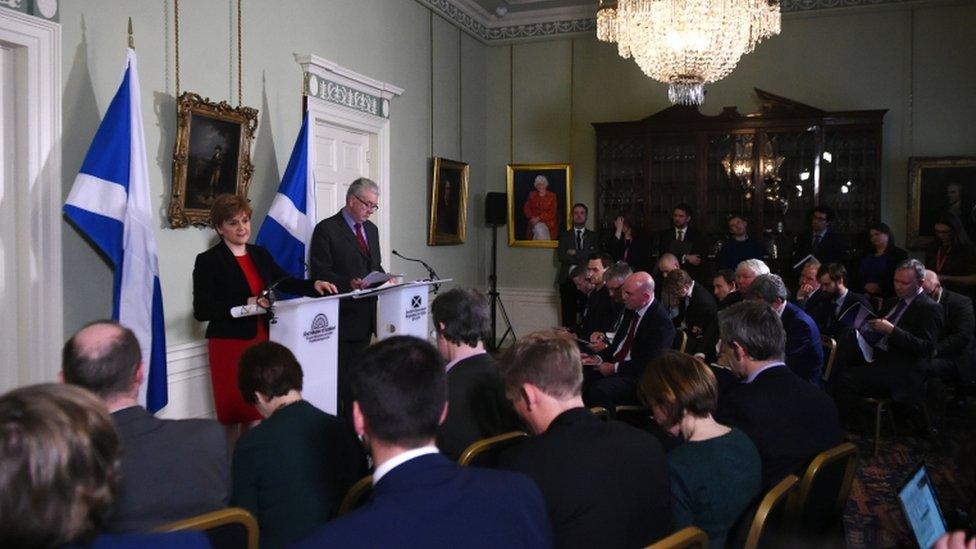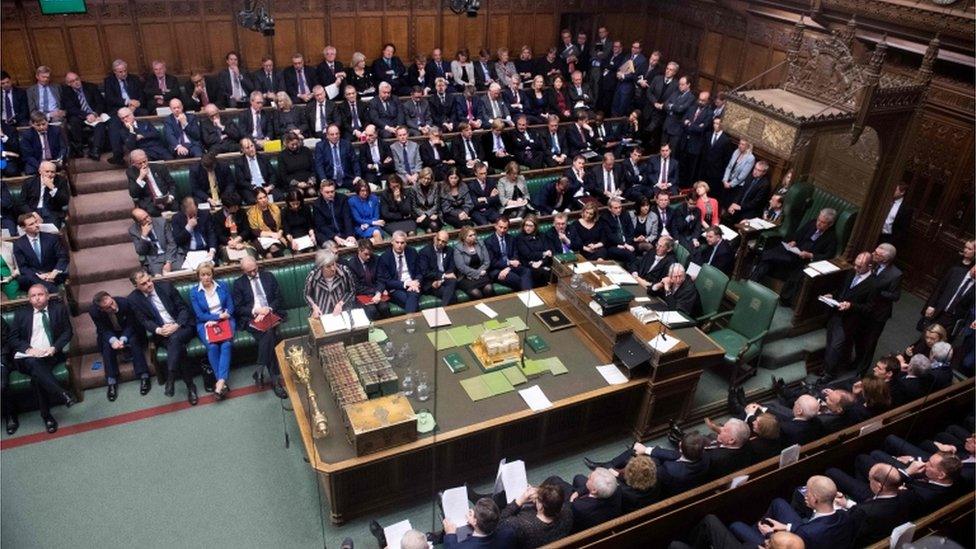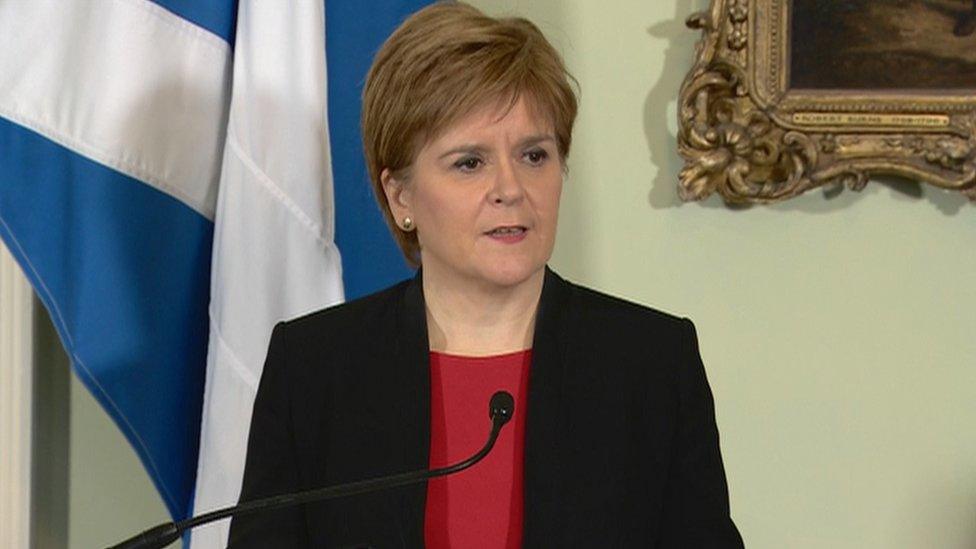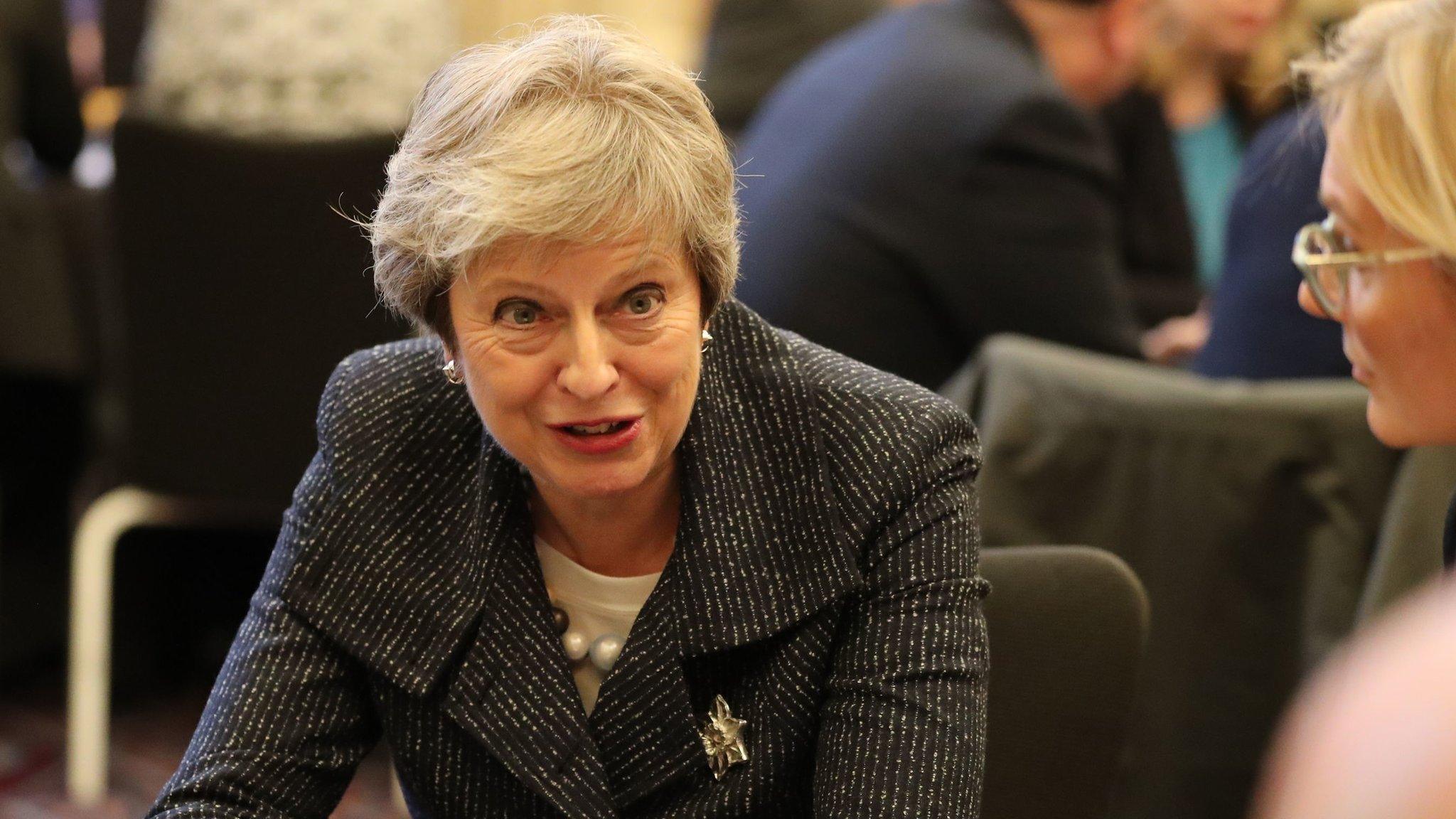Analysing the alternatives
- Published

Nicola Sturgeon faced the media at Bute House
In these troubled times, every word counts - especially those featuring in the 585-page Brexit withdrawal agreement and its concomitant political declaration.
But the prime minister's opponents also need to be wary. And so Nicola Sturgeon, while sounding confident, also proceeded cannily when facing the wicked media today anent the topic of her latest Brexit analysis.
She was, she said, "cautiously optimistic" that Labour at Westminster might be persuaded to back a second referendum on Brexit - her favoured option right now, in that it offered the prospect of remaining in the EU.
Alternatively, she speculated that a majority might be assembled in the Commons for a Norway-plus deal, retaining membership of the single market and customs union.
I asked about a general election. She gave the expected reply that she was ready for such a contest at any time - bring it on etc - while suggesting that, on balance, it was less likely in that it required Parliament to surmount the obstacles of the Fixed Term Parliaments Act.
Either way, she insisted that there were alternatives, that it was not acceptable for Theresa May to argue that it was her deal or chaos.
And what about independence? I was very far from the only member of the wicked media to inquire about the timing of a second independence referendum.
Ms Sturgeon smiled, tolerantly, at our persistent, mischievous ways. Then proceeded to remind us that she had promised an answer on that one when there was Brexit clarity which, at the moment…we got the point.
Nicola Sturgeon said that no Scottish government could possibly accept a deal which left the country poorer
Then yet more caution. One exceptionally determined journalistic chum queried the likelihood of MPs who support the union reaching a consensus with the SNP, albeit on a different constitutional matter.
Ms Sturgeon began a familiar reply, to the effect that she had scarcely disguised her yearning for independence. She added "in the long term" - before very quickly correcting herself to say "hopefully, not very long term".
You see the snag. It is arguably understandable that Ms Sturgeon should hold off for now. There may be, as she said, a second EU referendum or a general election or, who knows what.
But delay too long, let that "not very long term" stretch into the distance and the faithful might become restless. Although, to be frank, I think the vast bulk of her party understand the concept of a strategic holding pattern.
Number crunching
Back, though, to the paper. It builds on previous analysis published by the Scottish government which analysed sundry scenarios which might arise from the general objective of leaving the European Union.
Today's effort narrows the focus, deploying the parameters of the PM's deal and characterising it as, ultimately, a free trade agreement with no membership of the customs union or single market and an end to free movement (each of these regarded as inimical by Ms Sturgeon).
The calculated cost is thus a shrinkage of £9bn in the Scottish economy over a decade-plus, up to 2030 - or £1600 per head in Scotland.
Ms Sturgeon argued that no government with the interests of Scotland in mind could tolerate such a deal. This was, of course, a deliberate echo of the prime minister's previous statement with regard to Northern Ireland.

How many of Theresa May's backbenchers will back her in December's vote?
But are we not past the time for numbers? Are we not into the parliamentary end game? That, argued Ms Sturgeon, would be to play into the prime minister's hands.
I think that, with regard to this point, Ms Sturgeon is aware that there might be an enticing appeal in the PM's case that folk are sick of Brexit discourse and simply want a deal. Not least because it probably has a fair degree of rough truth about it.
Today's document is designed to shore up the case against this appeal. It is to say "up with this we cannot put" - and, moreover, here's why, yet again.
Longer term, if the first minister will tolerate such usage, it might also play a part in the case for independence.
'We really tried'
Nicola Sturgeon will be able to point to umpteen efforts to mitigate Brexit, to reach consensus, stretching from the referendum to the endorsement by the EU27 and beyond, to the very eve of the Commons vote on December 11.
If it comes to it, she wants to be able to say to the people of Scotland "we tried, we really tried". We tried to strike a compromise - but we were rebuffed, ignored.
In their turn, the Conservatives are aware of that potential argument. Which is precisely why Jackson Carlaw sought to rebut it, when I interviewed him today after the FM's news conference.
The Scottish Tory interim leader argued that Ms Sturgeon had no authentic interest in striking a bargain, in generating a Brexit deal. Rather she wanted there to be no deal, so that she could advocate independence again.
Certainly, Ms Sturgeon told me today that the Brexit decision and the subsequent process - when, she said, Scotland had been sidelined - had made the case for independence "immeasurably stronger".
But when journalistic chums asked once more for the date of the referendum, she resorted again to caution. She told one that, when she had made up her mind, "you will be the first to know".
Then she corrected herself again. "One of the first to know", said with a smile. It was a day, it is a time, for precise speech.
- Published27 November 2018

- Published27 November 2018
